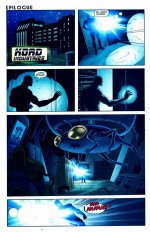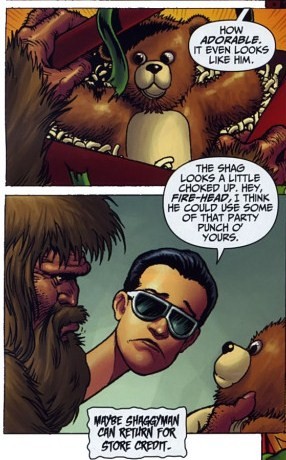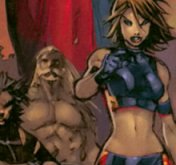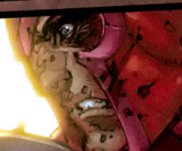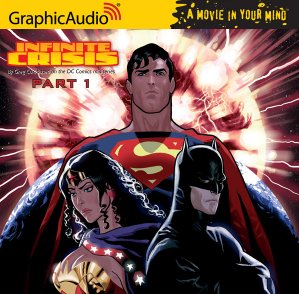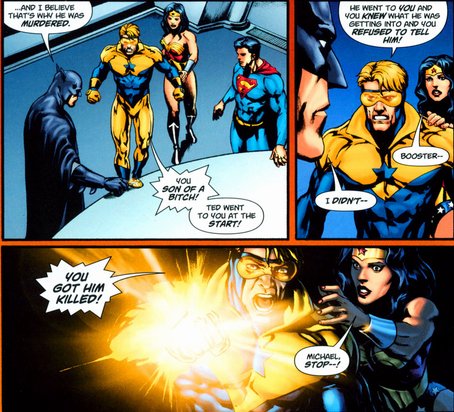Listen y’all, here go the moral of the story.
Bonny Blue Beetle is dead and gone. He’s joined the ranks of Firestorm (35 issues), Spider-Girl (130ish issues), Checkmate (31 issues), Manhunter (30-odd issues), Catwoman (82 issues), The Order (10 issues), Blade (12 issues), and dozens of other critically acclaimed victims of the direct market. All of these, excepting I think Catwoman, fell prey to the doom of all comics: low sales. Sales spike every once and a while, but comics generally sell less each month.
Now, the question isn’t whether or not these comics are dead. That’s obvious– they are, and they aren’t coming back. And if they do come back, they’ll just pull a Manhunter and bite it again six issues later.
No, the question is who killed Blue Beetle, and when?
Most people would say DC Comics killed it. They didn’t market it right, they didn’t give it enough of a chance, maybe they should have eaten their losses, maybe so-and-so (Blue Beetle) can join one of the worst written books in the line (Teen Titans), and so on. If only DC Comics had done their job, things would be okay!
I think the answer is a bit more obvious than that. Who killed Blue Beetle? Comic fans did.
Looking at the top 300 books for September 08 tells me one thing. There are exactly two books in the top 20 that fall into the critically acclaimed column– All-Star Batman and All-Star Superman. Those don’t count, though, since they have big names attached and are tentpole titles. I had to drop down to #41 to find another one of those books (Incredible Hercules), #61 for the next (Nova), #69 for another (Captain Britain), and it stays dire after that. Blue Beetle came in at #161, with around twelve thousand sales.
The “Blame DC” model tends to work in the “If you build it, they will come” model. However, DC built Blue Beetle. They made it easy to get into and it tied into a few of their big events (Infinite Crisis, Sinestro Corps, and Countdown). It was fun and funny. They did their job. Why didn’t it work out and go on for 800 issues? (My question is ‘why should it?’ but that’s another post entirely.)
It didn’t work because of comics fans.
Comics publishers push a certain subset of their books as being very Important and Essential and Vital to Understanding the Future of the ______ Universe. “This is the story you need to read,” they tell you. “This is the story I need to read!” you respond.
And that’s how Ultimates 3, a book that I have yet to see one person say was worth the 2.99 online or in real life, sells ten times as many comics as Blue Beetle, a book that everyone supposedly loves.
Every time a new event is announced, comic fans grumble. “Ugh, I have to read all these books to know about the Marvel Universe?” I was in the room at New York Comic-con ’07 when World War Hulk was announced… two days after Civil War #7 shipped. The room didn’t cheer. There were no excited “WHOO!”s going on. There were some polite claps. Everyone was tired of events. “Event fatigue.”
World War Hulk came and went and was a big success. Big surprise there. Event fatigue must be a myth, because people grumble every time one is announced and then it goes on to become a sales juggernaut.
Comics companies have learned that if you say that something will change everything forever, or feature a character death, or kickstart a new and important story, comics fans will eat it up.
Blue Beetle, despite its original positioning, was not Important. It was about a kid from El Paso who was wrestling with a hero’s life. Catwoman was about a morally gray woman who wanted to look out for herself and her child while pulling off some cool heists. Spider-Girl was the last vestige of ’90s Marvel.
They are separate from the main continuity. New Krypton has no ties to Jaime Reyes down in Texas. Selina Kyle doesn’t even know Black Lanterns exist. Spider-Girl can’t factor into Secret Invasion. So, these books are unimportant. You can get the whole story by reading the Important books, why should you bother with these stories that don’t have nothing to do with nothing?
Do you see what I’m getting at here?
Companies realized that comic fans will eat up that continuity porn garbage rather than read an irrelevant story, no matter how good. People would rather see a halfway decent Batman story than a great one featuring anyone else.
New Krypton has so far resurrected a couple of Golden Age heroes (one of them over Grant Morrison’s wonderful Manhattan Guardian), killed Pa Kent, shipped two specials, re-introduced Nightwing and Flamebird (don’t ask who they are, you mean you don’t know already?) and gotten down to tying all of the Superman books together into one tightly packed ball of continuity.
Geoff Johns’s JSA has been talking about Kingdom Come for what feels like eight years already, but that’s impossible because the series hasn’t even been around for two years yet. Final Crisis is setting up some big new status quo that we don’t even know the details of yet, and Secret Invasion is getting us ready for Dark Reign, where Norman Osborn runs SHIELD and Iron Man is on the run.
Green Lantern is busy turning space cats into murderous vomit fetishists and naming villains things like Atrocitus and Kryb and Spacehitlersiegheil so as to set up Blackest Night, where a bunch of dead characters will come back and have their own space laser rings so they can shoot the people with other space laser rings of other colors until Hal Jordan gets one of each ring and becomes the White Lantern, the greatest of them all, and we will all learn a very valuable lesson about controlling our emotions, but not being afraid to feel, at the end of the day.
And all of these stories will sell 100k copies a month while other series die on the vine.
Basically, us comics fans got the comics industry we deserve. Why? Because we care about important books.
This is the industry we’ve built.




